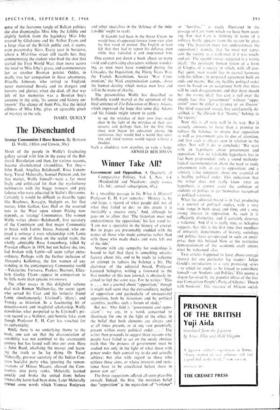The Disenchanted
MOST of the people in Wolfe's fascinating gallery served with him in the cause of the Bol- shevik Revolution and then, for various reasons, became disenchanted vivandieres. Yet they— John Reed, Angelica Balabanoff, Rosa Luxem- burg, Yusuf Meherally, Samuel Putnam and, for that matter, Wolfe himself—were a far more lively and cultivated lot than the nyeAulturny technocrats with the baggy trousers and grey fedoras who were educated in Stalin's file-rooms. Certainly it would be difficult to describe types like Brezhnev, Kosygin, Shelepin or, for that matter, John Gollan, Gus Hall or the assorted nuts in the West upon whom Peking now depends, as 'strange' Communists. The women Wolfe writes about—Balabanoff, first secretary of the Comintern and first major Communist to break with Lenin; Inessa Armand, who en- joyed a ménage a frois relationship with Lenin and was one of those on the sealed train; the wholly admirable Rosa Luxemburg, killed by Prussian officers in 1919, but not before she, too, had broken with Lenin—all seem rather extra- ordinary. Perhaps with the further inclusion of Alexandra Kollontay, the few women of any standing in the contemporary Communist world —Yekaterina Furtseva, Pauker, Ibarruri, Eliza- beth Gurley Flynn—appear in comparison to be little more than epicene tricotenses.
The other essays in this delightful volume deal with Roman Malinovsky, the secret agent who served his Czar and his intimate friend Lenin simultaneously; Litvinoff's 'diary': and Trotsky as historian. In a fascinating bit of detective-work and insightful scholarship, Wolfe demolishes what purported to be Litvinoff's pri- vate record as a Stalinist, anti-Semitic fake, even though Professor E. H. Carr has vouched for its authenticity.
While there is no underlying theme to the book, one can see that the disassociation of sensibility was not confined to the seventeenth century but has lasted well into our own. Here is John Reed, idealising the masses and learn- ing the truth as he lay dying. Or Yusuf Meherally, pre-war secretary of the Indian Con- gress Socialist party who, ignoring the remon- strations of Minoo Masani, allowed the Com- munists into party ranks. Meherally learned quickly and broke the united front before irreparable harm had been done. Later Meherally uttered some words which Vanessa Redgrave
and other specialists in the 'defence of the inde- fensible' ought to read:
If Gandhi had been in the Soviet Union. he would have disappeared forever from view after his first word of protest. The English at least felt that they had to report his defiance, even while they ridiculed it and imprisoned him.
One cannot put down a book about so many vivid and captivating characters without wonder- ing, as men must have wondered during the Crusades, the Inquisition, the Thirty Years War, the French Revolution, Soviet 'War Com- munism,' the Nazi extermination camps, about the human destiny which makes men love and kill in the name of charity.
The personalities Wolfe has described so brilliantly would marvel at the optimism of the final sentence of The Education of Henry Adams, which expressed the hope that some day Adams and his friends might return to earth to see the mistakes of their own lives made clear in the light of the mistakes of their suc- cessors; and perhaps then, for the first time since man began his education among the carnivores, they would find a world that sensi- tive and timid natures would regard without a shudder.
Such a shuddery non sequitur, so vain a hope.
ARNOLD BEICHMAN






























 Previous page
Previous page